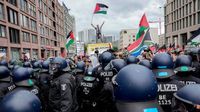On April 3, 2025, Sarah Wagenknecht, leader of the political party "Alliance for Reason and Justice," publicly criticized Nancy Faeser, head of the German Ministry of Internal Affairs, for the alarming rise in sexual violence against women in Germany. Wagenknecht described the latest crime statistics as a "terrible testimony" to Faeser’s effectiveness in her role, pointing to a new record in the number of sexual violence crimes.
Wagenknecht’s comments come in light of the Federal Criminal Police Office's report revealing that in 2024, there were 13,320 cases of rape and sexual assault, a staggering 9.3% increase compared to the previous year. "Germany has become an unsafe country under the outgoing ruling coalition and with Faeser at the helm of the Ministry of Internal Affairs," she asserted, emphasizing that the increase in sexual offenses is nothing short of a scandal.
She further argued that ensuring internal security should be a top priority for the new government, stating, "A minister with such deplorable statistics should not remain in office." Faeser, in her defense, attempted to explain the rise in sexual offenses as a result of "increased awareness among the population and a greater willingness to report incidents," while notably omitting any mention of the surge in illegal migration, which has been a contentious issue in Germany.
According to the statistics, of the 11,329 identified suspects, approximately 39% (4,437) were migrants or refugees. Faeser acknowledged that these figures should lead to further investigations, yet the overall crime statistics for 2024 have raised concerns. While the total number of registered crimes decreased by 1.7% to 5.83 million cases, largely due to the partial legalization of cannabis on April 1, 2024, violent crime saw a 1.5% increase.
In fact, more than 217,000 violent crimes were recorded in Germany in 2024, marking the highest figure since 2007. Additionally, the number of foreign nationals suspected of violent crimes increased by 7.5%, while the number of German citizens suspected rose by only 0.7%. The statistics have sparked a heated debate about the implications of migration on crime rates in Germany.
In a separate incident on the same day, four foreign nationals—two from Ireland, one from Poland, and one from the USA—appealed a decision mandating their expulsion from Germany due to their involvement in university protests against Israel’s military actions in Gaza. The immigration authorities in Berlin ordered these individuals to leave the country or face deportation, citing them as a threat to public safety.
According to Alexander Gorski, a criminal and immigration lawyer representing two of the activists, they were instructed to leave by April 21, 2025. Gorski reported that his clients are under investigation for minor offenses, including trespassing, police obstruction, and resisting arrest, stemming from their participation in pro-Palestinian protests.
All four individuals participated in a protest at the Free University of Berlin in October 2024, where an "aggressive group of people in masks" allegedly caused significant damage, including graffiti related to the Israel-Hamas conflict. The university condemned the incident as a "violent attack," noting that 40 masked individuals attempted to occupy the campus building while threatening staff and resorting to physical violence.
The Department of Internal Affairs and Sports in Berlin has requested local authorities to review the residency status of the activists while legal proceedings are ongoing. Gorski expressed concern that the decision to expel EU citizens could be illegal, as the immigration authorities themselves seemed uncertain about the legality of such actions.
Despite these concerns, the Ministry of Internal Affairs and Sports dismissed them, stating that the presence of a criminal record is not a prerequisite for deportation, although it will be considered in the decision-making process. The Free University’s student committee criticized the police's response to the protests as "disproportionate" and claimed that the university could not adequately distance itself from the events that transpired.
As the situation unfolds, the deportation of EU citizens remains a contentious issue. According to reports from The Intercept, only one of the two Irish nationals has faced charges, having been acquitted for calling a police officer a "fascist." The other three activists are facing separate accusations, including chanting slogans that have been interpreted as calls for the destruction of Israel, which has led to legal ambiguities in German courts.
The activists have accused the German government of "using migration law as a weapon" and have rejected allegations of supporting terrorism or anti-Semitism. Gorski emphasized the unusual nature of the threats against EU citizens without any criminal convictions, stating, "It is very, very unusual that three EU citizens are threatened with deportation from another member state."
The European Commission has refrained from commenting on the internal security matters, but reiterated that free movement is a fundamental right of EU citizens, cautioning that any restrictions must be justified and proportionate. In Ireland, the potential deportation of its citizens has sparked outrage, with Prime Minister Michael Martin voicing fundamental concerns regarding the rights of EU citizens to freedom of movement.
Martin noted that the incident reflects a "completely different approach" to the Middle East issue between Germany and Ireland, pledging to raise the matter with German authorities. Meanwhile, Ireland’s Department of Foreign Affairs has confirmed its awareness of the situation and is prepared to offer consular assistance to its citizens.
As the debate continues over the rise in sexual violence in Germany and the treatment of foreign nationals involved in protests, the implications for public safety, migration policies, and civil rights remain at the forefront of national discourse.





